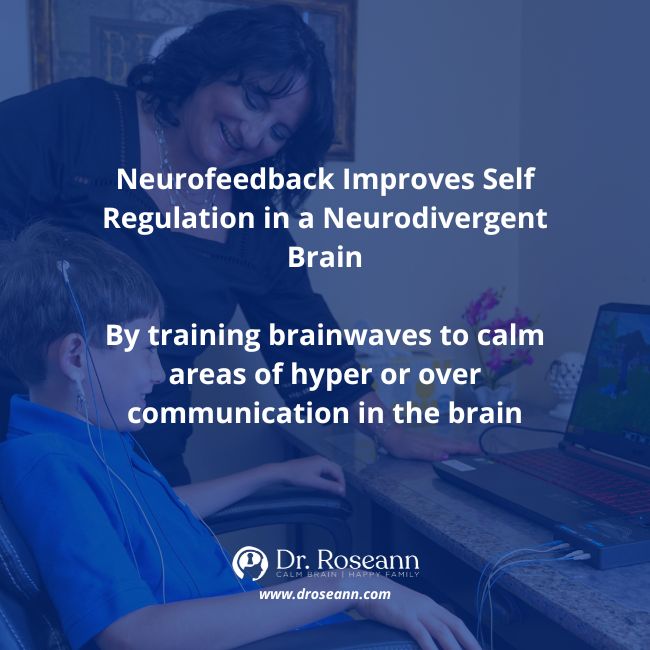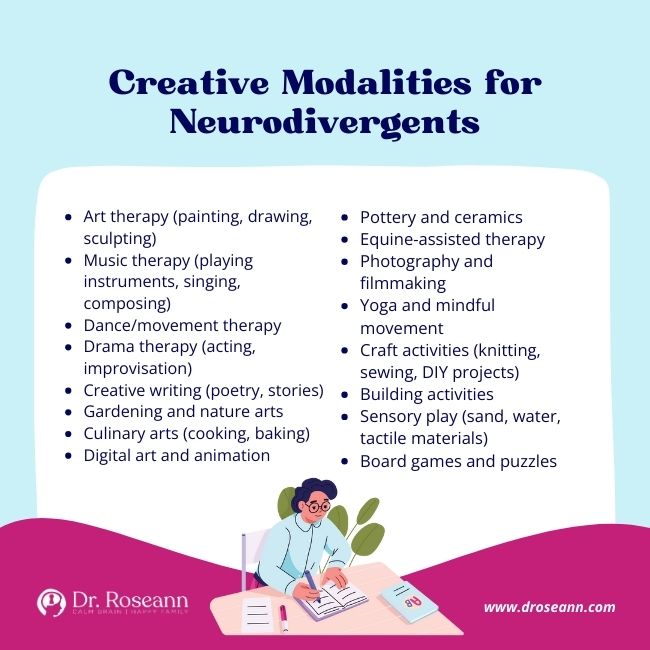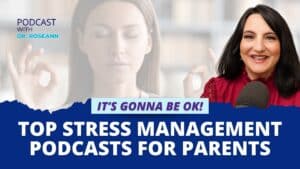As a holistic psychologist and neurodivergent therapist, I've dedicated my life's work to understanding and championing the unique needs of neurodivergent individuals. That’s why I studied and mastered a world of therapies tailored specifically for those with diverse neurological profiles.
Neurodiversity is a beautiful weave of human experience. It covers conditions such as autism, ADHD, dyslexia, and more. Neurodivergent traits contribute to the unique pattern of human cognition and behavior. However, navigating the challenges and celebrating the strengths inherent in neurodivergent conditions requires a delicate approach—one that traditional therapies often fail to provide.
That's where neurodivergent therapies come in. A neurodivergent therapy is an innovative approach that recognizes and honors the unique wiring of the neurodivergent brain. It offers a tailored intervention that fosters growth, resilience, and self-acceptance.
It isn’t about correcting the brain but rather about using strengths to boost areas that need optimizing. Remember whether you have a neurotypical or neurodivergent brain, all brains need support in self-regulation due to the daily stress we all face.
Natural Treatment for Neurodivergent Brains
The different kinds of neurodivergent therapies are as diverse as the individuals they serve. There are a range of therapies that foster self-regulation of the brain and body. Good examples are sensory integration techniques and mindfulness practices that can be used daily to calm the brain and body.
Here are some treatments you should ask from your neurodiverse therapist:
Neurofeedback Therapy
Neurofeedback is a non-invasive, medication-free approach that harnesses the brain's natural ability to regulate itself. Through real-time monitoring of brainwave activity, neurofeedback empowers individuals to gain insight into their brain functioning and learn to self-regulate (Niv, 2013).
Whether managing the signs of neurodivergence, ADHD, anxiety, or mood disorders, neurofeedback offers a path toward greater self-awareness and emotional well-being. Neurofeedback is a highly recommended neurodiversity therapy for kids.

Creative Modalities
Creative modalities offer neurodivergent individuals alternative pathways for self-expression and growth. Examples are equine-assisted therapy and art and music interventions.
These holistic approaches honor the mind-body connection, recognizing that healing occurs not just in the realm of thought, but also through movement, sensation, and creativity (Dunphy et al., 2019). They can be infused with sensory techniques that soothe the dysregulation that can occur with sensory processing difficulties.
Creative modalities can also bolster self-esteem and bring joy into one’s life when it aligns with one’s preferred interests. Think about building activities, art, and cooking as ways to help neurodivergents feel good about starting and completing tasks with success and a bit of fun too.

Group and Family Interventions
At the heart of neurodivergent therapies lies a profound respect for individual differences and a commitment to meeting each person where they are. Personalized coaching, group therapy, or family interventions, empower neurodivergents to thrive in a world that often fails to understand their unique gifts.
Explore the different paths to wellness that neurodivergent therapies offer. Celebrate the diversity of human experience and embrace the infinite possibilities for growth and healing that lie ahead. Together, we can create a world where neurodiversity is not just accepted but celebrated as a source of strength and resilience.
How to Find Neurodivergent Therapists
Finding the right neurodivergent therapist can significantly enhance your therapeutic journey. Here are some steps on how to find a counselor or maybe autistic therapists who offer neurodiversity affirming therapy.
1. Conduct a Search
Begin your search by utilizing online resources such as therapist directories and therapists finder tools. Ask around your community and get referrals from trusted healthcare providers as they are likely to have access to a therapist database.
2. Consider Virtual Therapy Options
Don't limit your search to nearby therapists. With the rise of the online therapy directory, you can access neurodivergent therapy from the comfort of your own home. Explore virtual therapy options from a licensed therapist.
3. Evaluate Compatibility
Once you've compiled a list of potential therapists, take the time to research each one and evaluate their approach to therapy. Look for therapists who prioritize creating a safe space for all individuals. Consider scheduling initial consultations to discuss your needs and ensure a good fit.
By following these steps, you can effectively find a neurodivergent therapist who can provide the support and understanding you deserve. Remember, therapy is a personal journey, and finding the right therapist can make all the difference in your healing process.
Finding Support For The Neurodivergent Brain Profile
Understanding the neurodivergent brain's functionality and developing techniques to amplify its strengths is the next phase in your journey.
Taking our course, Self-Regulation Mastery: A Parent's Path to Understanding and Managing Children's Dysregulated Behaviors and Emotions, gives you actionable tools to start helping your child today!
How do I find a therapist near me?
Find a therapist in networks and therapist directories. A list of therapists should come up that is tailored to your needs, location, and preferences. Be sure to consider someone who is an expert in neurodivergences.
What are these neurodiversity affirming therapists around me?
A neurodiversity affirming therapy acknowledges and celebrates the diversity of neurological experiences among individuals. They provide therapy that respects and validates the unique perspectives and needs of people with conditions in the neurodivergent list, such as autism, ADHD, dyslexia, and more.
How can I find a therapist near me who does neuro affirming therapy for kids?
To locate a therapist near you who offers neuro-affirming therapy for kids, use a tool that searches through a psychologist directory of therapists. Narrow down your search by filtering for therapists specializing in pediatric psychology or child counseling.
Why is it important to find therapists near me who are experts in neurodivergence?
It's crucial to find therapists near you who specialize in helping neuro divergent individuals because they possess the expertise and understanding needed to provide tailored support for your unique needs. Utilizing a therapist finder tool can help streamline the search process and connect you with the right professionals.
Should I find a therapist in my area?
While finding local therapists can offer convenience and accessibility, it's equally important to prioritize expertise and compatibility with your needs, especially in the realm of neurodivergency. Use a therapist directory to explore a wider pool of professionals who specialize in neurodiversity and resonate with your therapeutic goals, even if they're not near you.
How do I know if there's an adult therapist near me who can help our community?
To determine if there's an adult therapist nearby who can assist your community in educating you on a list of neurodivergent disorders, consider utilizing online therapy directories or a mental health therapist list.
Is it difficult to find a counsellor near me who specialize in neurodivergent treatment?
Finding a counselor near you who specializes in neurodivergent treatment can sometimes be challenging, but it's not impossible. A therapy directory will allow you to search for therapists based on their areas of expertise, including neurodiversity.
How do I know if the psychologist for autism near me does neurodivergent counseling?
To determine if the psychologist for autism near you is a neuro therapist, you can inquire directly about their experience and approach to therapy. Ask if they specialize in working with neurodivergent individuals or if they use specific techniques tailored to neurodiversity. That’s how you find a psychotherapist who is right for your child.
How do I know if the professional therapist near me is licensed?
To know if a therapist in the area is licensed, you can verify their credentials through a licensing board or regulatory body. Additionally, inquire about their approach to therapy, specifically if they practice neuroaffirming therapy or specialize in neurodiverse counseling.
Can the adult psychologists near me help my child?
While psychologists may have expertise in certain areas like therapists for autistic adults, it's essential to find a therapist who specializes in working with children and adolescents, particularly when addressing neurodivergent trauma. Look for a list of therapists who have experience in child psychology or pediatric counseling, as they are better equipped to understand your child's needs.
Why is it difficult to find autism therapists in my area?
Finding autism therapists in your area can be challenging due to several factors. Firstly, there may be a shortage of therapists specializing in autism or neurodivergence in certain regions. Use a therapy finder tool and practice persistence in researching and contacting local mental health organizations or support groups focused on neurodivergencies to help you.
How do I find the best psychotherapists near me?
To find the best psychotherapists near you, start by checking your insurance network for in-network therapists. If you can’t find therapist in network or counseling directory, request a therapy list from your healthcare provider.
How to find therapy near me that's within my means?
To find therapy near you that's within your means, search for databases of therapists or neurodivergence lists that offer sliding scale fees or accept insurance plans. Utilize therapist listings in your area and inquire about their payment options, including potential discounts or payment plans.
How do I find a therapist in my area who is also a neurodivergent doctor?
To find a therapist in your area who is also a neurodivergent doctor, consider using a neurodivergent therapist directory, which features professionals who identify as neurodivergents or specialize in working with neurodivergent clients. Look for therapists who display a neurodivergent logo or explicitly mention their understanding and support of neurodiversity in their profiles.
Should I go for an autism psychiatrist near me or just a licensed therapist near me?
Whether to seek out an autism psychiatrist or a licensed therapist near you depends on your specific needs and preferences. An autism psychiatrist specializes in diagnosing and treating autism spectrum disorders, often prescribing medication and providing medical management. On the other hand, a licensed therapist, including those who may have autism themselves, can offer counseling and therapeutic support tailored to individuals on the autism spectrum. Check a counselor directory for help.
Should I invest in a therapist counseling near me to get ND affirming therapy?
Investing in a therapist counseling near you who offers ND neurodivergent affirming therapy can be highly beneficial for individuals seeking understanding and support for their neurodivergent experiences. This therapy fosters a positive and validating environment that respects and celebrates neurodiversity. Use an ND directory to help you find therapists who specialize in this approach.
I need a therapist near me. who are the top counselors near me that can help?
Finding the top therapist locally depends on various factors such as your specific needs, preferences, and location. It’s easy to find local therapists near me if you start searching reputable online therapist directories.
How to find therapists near me who can help my whole family?
To find therapists near you who can help your whole family, consider reaching out to licensed clinical social workers (LCSWs) or licensed professional counselors (LPCs) in your area. Do a on online search for LCSW near me or LPC near me to get started.
Citations
Dunphy, K., Baker, F. A., Dumaresq, E., Carroll-Haskins, K., Eickholt, J., Ercole, M., Kaimal, G., Meyer, K., Sajnani, N., Shamir, O. Y., & Wosch, T. (2019). Creative Arts Interventions to Address Depression in Older Adults: A Systematic Review of Outcomes, Processes, and Mechanisms. Frontiers in Psychology, 9(6). https://doi.org/10.3389/fpsyg.2018.02655
Niv, S. (2013). Clinical efficacy and potential mechanisms of neurofeedback. Personality and Individual Differences, 54(6), 676–686. https://doi.org/10.1016/j.paid.2012.11.037
Dr. Roseann is a mental health expert in Neurodivergence who frequently is in the media:
- Break the Rules Podcast Overcoming Anxiety & Mental Health Disorders.
- CBS2 New York (Article) Experts Offer Tips On How To Help Children Deal With Anxiety.
- Byrdie Smiling at Strangers was a Helpful Tool for my Social Anxiety.
Always remember… “Calm Brain, Happy Family™”
Disclaimer: This article is not intended to give health advice and it is recommended to consult with a physician before beginning any new wellness regime. *The effectiveness of diagnosis and treatment vary by patient and condition. Dr. Roseann Capanna-Hodge, LLC does not guarantee certain results.
Are you looking for SOLUTIONS for your struggling child or teen?
Dr. Roseann and her team are all about science-backed solutions, so you are in the right place!
Grab your complimentary copy of
147 Therapist-Endorsed Self-Regulation Strategies for Children: A Practical Guide for Parents
Dr. Roseann is a Children’s Mental Health Expert and Licensed Therapist who has been featured in/on hundreds of media outlets including The Mel Robbins Show, CBS, NBC, PIX11 NYC, Today, FORBES, CNN, The New York Times, The Washington Post, Business Insider, Women’s Day, Healthline, CNET, Parade Magazine and PARENTS. FORBES called her, “A thought leader in children’s mental health.”

She coined the terms, “Re-entry panic syndrome” and “eco-anxiety” and is a frequent contributor to media on mental health.
Dr. Roseann Capanna-Hodge has three decades of experience in working with children, teens and their families with attention-deficit hyperactivity disorder (ADHD), autism, concussion, dyslexia and learning disability, anxiety, Obsessive Compulsive Disorder (OCD), depression and mood disorder, Lyme Disease, and PANS/PANDAS using science-backed natural mental health solutions such as supplements, magnesium, nutrition, QEEG Brain maps, neurofeedback, PEMF, psychotherapy and other non-medication approaches.
She is the author of three bestselling books, It’s Gonna Be OK!: Proven Ways to Improve Your Child's Mental Health, The Teletherapy Toolkit, and Brain Under Attack. Dr. Roseann is known for offering a message of hope through science-endorsed methods that promote a calm brain.
Her trademarked BrainBehaviorResetⓇ Program and It’s Gonna be OK!Ⓡ Podcast has been a cornerstone for thousands of parents facing mental health, behavioral or neurodevelopmental challenges.
She is the founder and director of The Global Institute of Children’s Mental Health, Neurotastic™Brain Formulas and Dr. Roseann Capanna-Hodge, LLC. Dr. Roseann is a Board Certified Neurofeedback (BCN) Practitioner, a Board Member of the Northeast Region Biofeedback Society (NRBS), Certified Integrative Mental Health Professional (CIMHP) and an Amen Clinic Certified Brain Health Coach. She is also a member of The International Lyme Disease and Associated Disease Society (ILADS), The American Psychological Association (APA), Anxiety and Depression Association of America (ADAA) National Association of School Psychologists (NASP), International OCD Foundation (IOCDF).
© Roseann-Capanna-Hodge, LLC 2024










